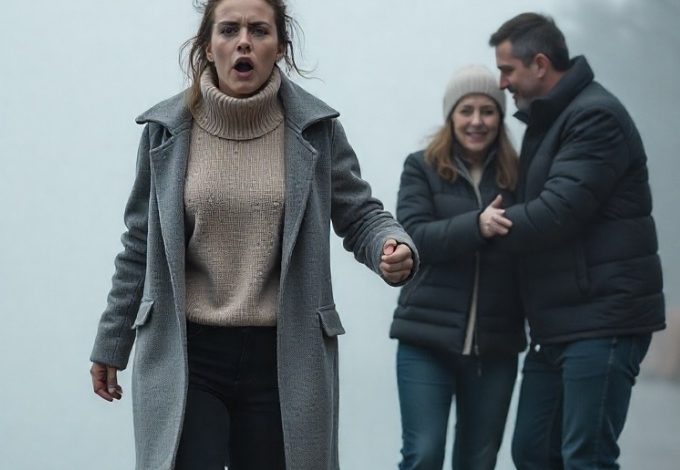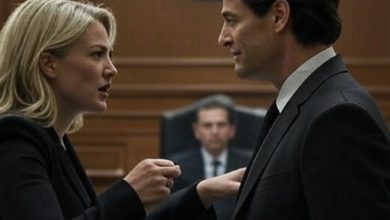From Lakefront Nightmare to Justice: A Quiet Mom, a Relentless Brother, and the Fall of a Untouchable Dynasty

The wind at Vandor’s Lakehouse carried the smell of pine and cold water. Most people would have called it a perfect day—quiet shoreline, neat lawn, the huge wooden house looking out over Lake Tahoe like a fortress. But for me, Eleanor, the air always carried something else when we were there: a warning. I sat apart on a wicker chair and watched my daughter, Milina, move around the patio table. She poured aged scotch for her husband Preston and for his father Garrett, laughed when they laughed, and tried to keep the mood light. Her laugh sounded bright on the outside and tight on the inside. I knew that laugh. It meant she wanted peace more than anything.
Garrett and Preston liked to show off. The house was a monument to money: high windows, perfect hedges, and expensive cars lined up by the gate. Even the grass felt strict—no dandelions, no wild edges, no softness anywhere. I came only because Lena—that’s what I call Milina—kept asking. “Mom, please come. It matters to them that we all gather.” I knew the truth: it mattered to her. She wanted to believe she had married into a real family. I wanted that for her too, but I had never trusted the look in Garrett’s eyes or the smirk that always lived at the corner of Preston’s mouth.
By late afternoon the men had been drinking. Their jokes got louder. Their movements grew careless. Preston’s voice turned sharp around the edges. Garrett slapped him on the shoulder and called him “champ,” like they were still on a high school team. The lake looked dark and cold behind them.
Garrett tilted his chin at Lena’s jacket. “Why’s our city girl bundled up like that?” he boomed. “Bit of breeze never killed anyone.”
“It’s chilly by the water,” Lena answered with a small smile. “That’s all.”
Preston rolled his eyes at his father. “In our day, girls swam in October. Toughened them up.”
I said, “Leave her alone,” not loud, but clear enough. My voice didn’t belong on that patio; it felt like an old floorboard creaking in a brand-new house.
Preston hated when I spoke up. He turned toward me with that mocking glint. “Eleanor, relax. We’re teasing.”
Lena nodded too quickly. “Mom, I’m fine.”
But I saw Preston and Garrett share a look—quick, mean, the kind that says let’s do it. Garrett stood, his shadow long across the grass. “Come on, let’s see how brave you are,” he said, half laughing, half daring.
“What are you doing?” I asked, stepping forward. “You’ve had too much to drink. Stop.”
They didn’t stop. They took Lena by the arms—still acting like it was a joke—and walked her toward the dock. She tried to laugh it off, then realized it wasn’t a joke at all. “Preston, don’t! Dad, please!” Her voice broke.
At the very end of the pier the lake turned almost black. “Go on, city girl,” Preston said, and with Garrett’s help he shoved. There was a wide splash, a swirl of bubbles, and then only ripples spreading out on the surface.
Lena didn’t pop up.
I froze, then screamed. “Help! She hit her head!”
The men stood there grinning like boys who had pulled off a prank. “She can swim,” Garrett said. “Enough drama.”
I screamed again. “She’s not moving!”
They turned their backs. SUV doors slammed. Tires crunched on gravel. The red shine of taillights slid away through the trees. They left.
The water stayed flat. For a moment my voice died completely. Then, near the edge, a pale face broke the surface—Lena’s. Blood ran from her temple. Her eyes looked past me, unfocused. She sank again.
A small engine coughed somewhere past the reeds. A fisherman in a battered camo jacket turned his boat toward my waving arm without asking a single question. He killed the motor, leaned far over with a boathook, snagged fabric, and heaved. The hook tore a sleeve; a limp arm drifted up. He dragged her into the boat and started CPR right there on the water. I dialed 911 with hands that didn’t feel like mine. My voice sounded steady, like a machine. I gave the gate code, the path to the dock, the nearest cross street.
The ambulance pulled in fast, lights washing the trees red and blue. Medics lifted Lena, wrapped her in blankets, and spoke in clipped terms: “Weak pulse… severe hypothermia… probable concussion.” The doors closed. The siren rose and carried my girl away.
I didn’t climb in. I stood on the dock and felt something inside me turn from fire to ice. Then I reached into Lena’s coat pocket—her phone was still there, buzzing with a call from My Sweetheart. I let it ring out. I scrolled to a number I hadn’t used in ten years and pressed call.
He answered on the fourth ring. “Yeah. Who is it?”
“It’s me,” I said. “Eleanor.”
Silence, then a shift in his tone—as if a machine long idle had just powered up. “I’m listening,” Isaac said.
“They’re headed home,” I whispered, staring at the water. “Do what you have to do.”
I hung up.
At the ER, the doctor said Lena would likely live: concussion, water in the lungs, dangerously low body temperature, but stable. The words didn’t bring peace; they brought direction. The fisherman stopped by long enough to nod and disappear. I thanked him with my eyes. He seemed to understand.
Sitting alone in the corridor, I answered a call on Lena’s phone. “Hey, sweetheart,” Preston said, irritated. “Where are you? Your mom is being theatrical.”
“She’s alive,” I said, calm and flat.
He paused, surprised to hear me. “Put her on.”
“Don’t come here.” I ended the call. A while later a huge bouquet of white lilies arrived with a card tucked into it: Let’s not let your mother’s theatrics ruin our fun. I told the nurse to throw them out because Lena was “allergic.” Really, I just refused to let that smell of funerals fill her hallway.
That night I sat outside ICU and didn’t sleep. I didn’t pray. I did the only thing that quieted my mind: I made a plan. Isaac was once the best investigative reporter in the state—too sharp, too relentless, and eventually pushed out. He knew where the bodies were buried because he knew who buried them. If anyone could pull a hidden thread from the Vandor world and unravel it, it was my brother.
By morning he called. His voice was rough from coffee and no sleep. “I have something,” he said. “Twenty-two years ago, same lake. Garrett Van Doran went out on a boat with his business partner, Malcolm Pierce. Only Garrett came back. Official story: Pierce got drunk, fell, hit the propeller. Case closed in a week.”
A week was too fast. Isaac had tracked down the retired detective who handled it. The man confessed he’d been pressured and paid. He’d lived with that shame ever since. Isaac also found Pierce’s son—an auto mechanic who kept letters where Pierce wrote about Garrett cheating him out of shares and his plan to contact the district attorney. Pierce died days later.
I didn’t gasp. I just listened. It fit the feeling I’d carried for years: that these men were cruel not only when drunk at a lake but in boardrooms and back rooms, too. “What now?” I asked.
“Now we use it,” Isaac said.
Lena woke later that day, weak but present. “Did Preston call?” she whispered.
“Yes,” I said. “And he sent flowers.”
“What did he say?”
“He said I was dramatic.”
She turned toward the window, and a single tear slid across her cheek. She didn’t defend them. She didn’t argue. She just went quiet, and that quiet spoke louder than anything she had said to me in years.
For two more days the hospital became our whole world: slow walks to the bathroom, sips of broth, soft chapters of short stories read aloud. Meanwhile Isaac worked. He didn’t attack the Vandors with shouting. He prepared with facts.
On the third day, he pressed “publish.”
His article—“Drowned Twice in the Same Lake: The Impunity of Garrett Van Doran”—hit a small blog and, within minutes, a hundred inboxes: newspapers, TV desks, prosecutors, watchdog groups. It laid out documents, quotes, old letters, a fresh account of what Garrett and Preston had done to Lena, and the note that came with those lilies. Clean facts, simple lines, no yelling. It didn’t need yelling.
At almost the same moment, Garrett’s hired men kicked down the door to Isaac’s long-abandoned apartment. The broken door became a perfect picture for the story: not only a scandal from the past, but intimidation in the present. The news spread like a spark across dry grass. Phones started ringing in places Garrett had always counted on. This time the people on the other end didn’t want to talk.
Garrett paced his big office and watched his world slip. Preston, who had expected Lena to call home apologizing, stared wide-eyed as his father made phone call after phone call and got only terse refusals. The old favors didn’t work anymore. The name “Van Doran” began to taste like metal in people’s mouths.
I didn’t watch TV. I didn’t need to see it. I could feel it happening.
A week later Lena moved to a regular room. She could sit up and talk without getting dizzy. We discussed small things: what soup she wanted; whether we should bring a little radio; which book to finish first. She didn’t say “maybe they didn’t mean it” anymore. I didn’t say “I told you.” We let the simple, quiet things hold us up.
Two weeks after Isaac’s story, the police arrested Garrett and Preston—first for what they had done to Lena, then on reopened suspicion around Pierce’s death. I learned about it from Martha, a friend who texted: Turn on the news if you want to see justice start. I didn’t turn it on. I focused on my daughter. The rest would take its course.
Lena filed for divorce. She did it steady and calm. Preston sent letters from jail—apologies, excuses, memories of good days. She read each one once, then tore it up gently, as if handling paper that might cut her. “Words are cheap,” she said softly. “I believed too many of them for too long.” I nodded. Sometimes the only way to rebuild a life is to stop building with promises and start building with actions.
When she was strong enough, we went to pack the house she had shared with Preston. The rooms were big and cold. We took only what was hers: clothes, photos, books, a few mugs. We left the rest like abandoned costumes after a bad play. She labeled the last box in shaky letters—Books: handle with care—and sat on the windowsill, knees tucked up, looking out at the street with a calm I hadn’t seen on her face in years.
“Where will we go?” she asked.
I pulled out an old ring of keys with a tiny silver book charm. “Home,” I said. “I bought back our old apartment near the library.”
Her head snapped toward me. A slow, real smile—hers, not the one she wore for the Vandors—spread across her face. That small place had held all our best years: creaky floors, sun in the kitchen in the afternoons, a window that looked into a quiet courtyard. I had sold it once to help Lena and Preston with a down payment. Buying it back felt like putting a book back where it belonged on the shelf.
We locked that cold house behind us and didn’t look back.
In the months that followed, the story kept rolling through courts and headlines. Isaac stepped aside once the paper trail and witnesses were in the hands of people with badges. He told the truth; the law could carry it the rest of the way. The Vandor empire—stock, properties, shortcuts, and old favors—collapsed like a stage set when the ropes are cut. I didn’t cheer. I just made tea for my daughter and went with her to doctor’s appointments and helped hang curtains in our little apartment.
Sometimes I visited the tiny hospital library where I had hidden on the day Isaac called with his first findings. I straightened the shelves again, instinctively, like breath going in and out. In a world that had felt wild and cruel, putting a book exactly where it belonged made sense to me. It still does.
Lena healed slowly. The scar on her temple turned pale. She started a part-time job, then a full-time one. She laughed again in a way that didn’t sound forced—small, warm, real. We cooked dinners together in a kitchen that fit us both at once only if we danced around each other. We did dance sometimes. On quiet Saturdays we spent hours reading, feet up, windows open to the courtyard. Freedom, I discovered, wasn’t loud. It was soft. It sounded like pages turning and a kettle whistling.
One evening as we shelved our own books, I realized the fear that had lived under my ribs for years was gone. Not because Garrett and Preston were in trouble, though they were. Not because people finally believed us, though many did. It was gone because my daughter was safe, and because we had built a life that didn’t require anyone’s approval.
Isaac came by for dinner once we were settled. He looked tired and happy in the way only he can—like someone who has chased a storm and then watched the sky clear. We didn’t rehash everything. We ate stew and bread and argued about which short story collection to trade next. Before he left, he stood in the doorway and touched the silver book charm on my keys.
“You did what you had to do,” he said.
“So did you,” I answered.
He grinned. “Takes two hands to tear down rotten boards.”
After he left, Lena slid the last book into place on the shelf. “Mom,” she said, “thank you for calling him.”
I looked at her—alive, wiser, and finally at peace. “You are why I did,” I said. “And why I’d do it again.”
We turned off the lamp. The apartment fell into the kind of quiet that belongs only to safe homes. Outside, the city moved on. Inside, we had time—time to heal, to read, to laugh, and to keep every promise that mattered.
And that was enough. It was everything.










